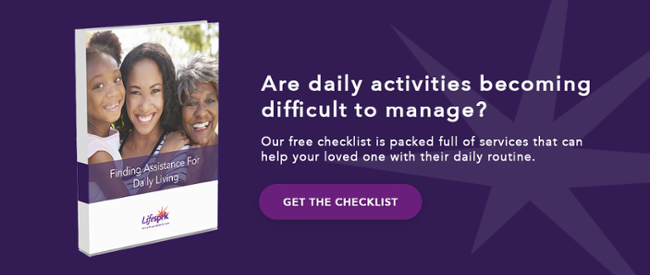
Have there recently been events that have led you to question if it’s safe and healthy for your loved one to consider living in their own home? If your loved one is like most seniors, they likely want to remain in their own home while holding onto their independence for as long as possible.
“We’ve seen the discussion around whether or not to move begin after a fall has occurred and for good reasons, falls can be unsettling for all involved,” said Vicki Condon, RN, Lifesprk RN Case Manager. “Guidance from a nurse can help your loved one avoid further decline and social isolation but it can also help you identify if staying home isn’t a safe option and how to start that conversation with your loved one, especially if exploring senior living options is what’s best.”
Deciding if it’s time for your loved one to move out of their home can be a tough conversation to have, this post can serve as a guideline for making those decisions.
Is your loved one able to care for themselves?
The biggest factor in deciding whether your loved one can continue to live in their own home is whether they’re able to care for themselves independently without putting their health or wellbeing at risk.
If you show up to your loved one’s home and the house seems to be in a different state then it has in the past, it may signal a red flag. For example, if your loved one’s home seems messy, there is mail stacked up, or an empty refrigerator or pantry those may be signs that they’re not able to take care of the tasks they used to.
Although these might seem like small instances in your loved one’s day-to-day obligations, these are often early signs that your loved one may be struggling. While these signs can be worrisome, they don’t necessarily mean your loved one needs to move out of their home. Keeping a close eye on some of these subtle changes can be great conversation starters as you broach how to help your older loved one age in place safely and stay in their home. By identifying things your loved one needs help with, you can find services that can make their life easier.
Are they at risk of having an accident?
Is your loved one’s mobility impared? If they struggle to move around or go up and down stairs, there’s a heightened risk of having a fall or accident.
Imagine receiving the news that your loved one has tripped on a rug and fallen down the stairs. With falls being the leading cause of both fatal and nonfatal injuries in people over age 65, more often than not, this is the call many adult children receive. And the thought of your loved one falling is shocking news for everyone. After a fall, it can take time for a senior to fully recover and get over the incident. What’s more, a fall can set an already fragile senior back and contribute to a greater loss of confidence.
The key to reducing falls and preventing them from happening is to minimize risks in the home wherever possible. Many in-home care providers offer home and safety evaluations to help you identify hazards within your home and what you can do about them to keep your loved one safe. In other situations where there are other obstacles that cannot be navigated like having too many stairs or significant home repairs, then it may be time to consider moving your loved one out of their home.
Can they remember day-to-day tasks?
Does your loved one struggle to remember what day it is? Do you find yourself repeating what you just said to them five minutes ago?
While we’re all guilty of occasionally forgetting things, there’s a difference between having a bad memory and struggling to recall daily tasks. If you’re worried that your loved one might go out grocery shopping and forget where she lives afterward, or that they won’t remember to take their heart medication, living at home may be compromising your loved one’s health and safety.
Perhaps your loved one is experiencing a decline in cognitive abilities as a result of a condition like Alzheimer’s disease or a related dementia disease. If that’s the case, you’re right to be concerned about their safety and welfare in their home, and correct to be considering moving them to a safer environment.
How do I decide what level of care my loved one needs?
While it’s always going to be difficult to evaluate what kind of care your loved one needs, the good news is that there are plenty of different options available. Finding the right living situation ensures that your loved one receives the level of care they need, whether staying in their home or moving to a more supervised environment.
First step – determine which activities your parents are capable of doing independently and which activities require some assistance and supervision. Can they bathe and dress themselves easily without help? Are they able to feed themselves and remember to take medications? Think about what sort of medical care they need, keep in mind their cognitive and medical condition will continuously change and shifts in care might be needed at different stages.
Once you have identified which daily activities your parents can and can not currently do, you can explore the next steps.
Where will they live?
Perhaps you’ve considered taking on the care of your loved one yourself, either by moving them into your home or by spending more time at their house. Be honest with yourself and determine if you’re easily able to offer enough time required to give them the care they need.
Don’t give in to family pressure or expectations — it’s important to make the right choice for both you and your loved one. Caring for them will take up a lot of your personal time and it’s important to think about the impact that will have on your career, friendships, hobbies, and home life.
Alternatively, your loved one might just need some help and assistance or care at scheduled times during the week at their home.
How a Lifesprk Life Navigator can help you
We’re changing up the senior home care services to deliver a unique experience to our clients. Life Navigators are on hand from the start to properly get to know you, your parents, and their health and well-being. Each senior’s needs are different, and we work alongside you to create a unique Whole Life Plan to help your family prioritize what’s most important.
Our experts are always happy to offer guidance, information, and resources to help you decide what level of care is right for your parents, and when it is time for them to move out of their home.



